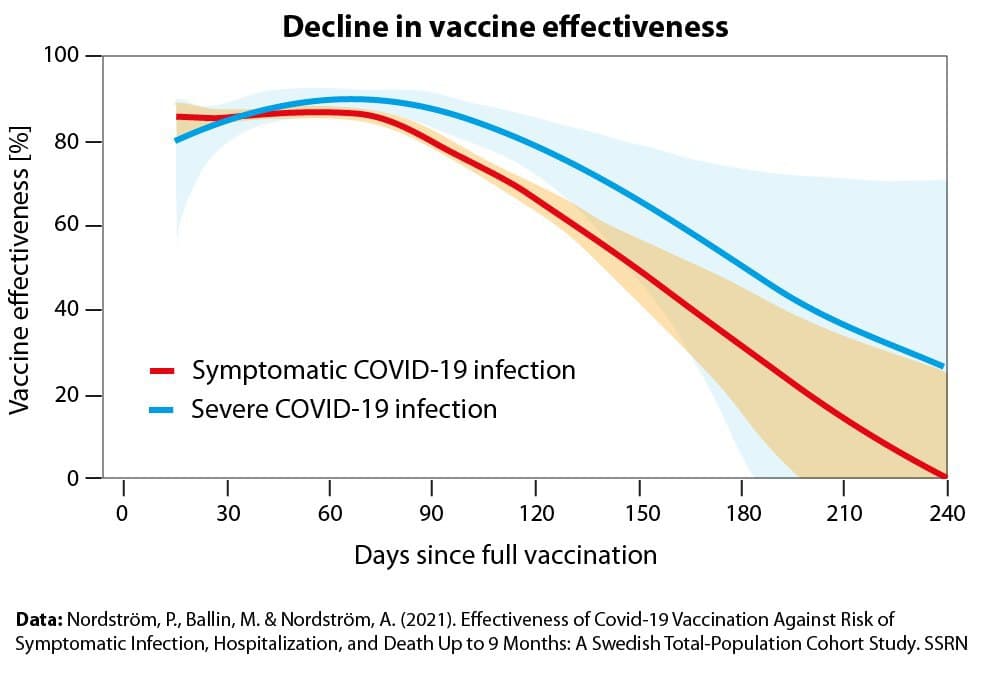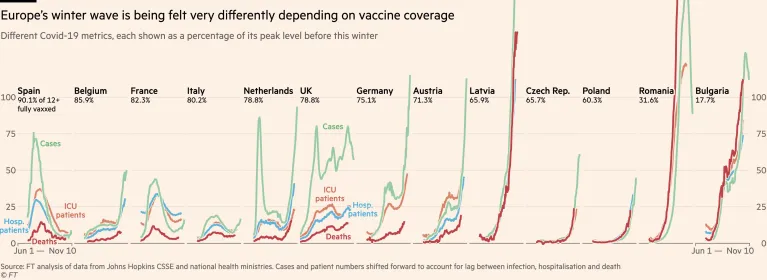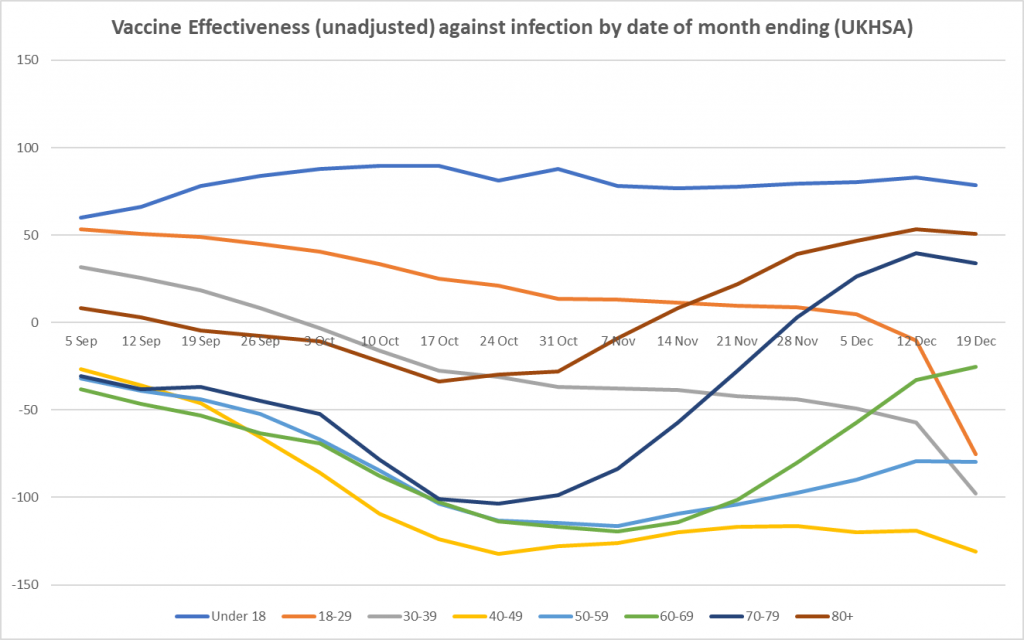Covid Vaccines: A Reality Check
DEBATES ON COVID - VACCINES, 3 Jan 2022
Swiss Policy Research - TRANSCEND Media Service
28 Dec 2021 – The latest unbiased facts on covid vaccine safety and effectiveness.
Covid vaccine effectiveness
Prior to the most recent immune-evasive mutation (omicron), covid vaccine protection against infection and transmission decreased to zero within about half a year, whereas protection against severe disease and death in senior citizens decreased from about 95% to about 50% within 6 to 9 months (depending on the vaccine, see chart below).
With omicron, protection against symptomatic infection has been reduced to just a few weeks, while protection against severe disease remains uncertain. However, there are indications that omicron really is significantly milder than previous variants, even in people without prior infection. Otherwise, omicron would have posed a major challenge to the entire global vaccination campaign.
Studies that claimed more durable vaccine protection typically combined several time frames (e.g. January to August instead of just August) or age groups (vaccine protection is more durable in younger people, but their covid risk is also much lower). An example of the latter is the Qatar study, the participants of which had a median age of just 31 years; in participants older than 60, protection against severe disease had fallen to 60% within 7 months, but this was only shown in the annex.
Vaccine protection against infection and severe disease (all age groups):
During 2021, covid vaccines may have saved several hundred thousand lives by mitigating the impact of the covid waves in spring (Alpha), summer (Delta) and early winter (also Delta). This can easily be seen by comparing countries with a high vaccination rate to countries with a low vaccination rate (e.g. Western Europe to Eastern Europe), or by comparing the impact of covid waves before and after vaccination in countries with a high vaccination rate (see next chart).
Importantly, prior to the winter wave of 2021/22, only about 20% to 50% of people in Western Europe and most US states had developed natural (i.e. infection-acquired) immunity against covid. In Latin America, parts of Africa (including South Africa) and parts of Asia (e.g. India), about 50% to 80% had developed natural immunity against covid. In some of these places, the flu has already returned.
Much lower covid deaths in high-vaccination EU countries:
Since autumn 2021, several countries reported a negative vaccine effectiveness against infection, that is, vaccinated people had a higher infection rate than unvaccinated people. In countries like the UK, raw negative vaccine effectiveness reached up to minus 100% in some age groups (i.e. vaccinated people had double the infection rate compared to unvaccinated people; see next chart). In response, several countries simply stopped publishing this data.
The most likely explanation for this observation is a catch-up effect: for several months after vaccination, vaccinated people had a lower infection rate than unvaccinated people. As a result, there are more “recovered” people – which have the strongest and most durable protection – among the unvaccinated than among the vaccinated. Once vaccine protection has declined, infections among vaccinated people start catching up.
A more troubling explanation for negative vaccine effectiveness against infection, proposed by some skeptics, would be some kind of negative immune effect. For instance, it is known that covid vaccination can cause a temporary immune suppression (lymphocytopenia) that can last for up to a week and possibly longer, and that likely plays a role in the well-documented post-vaccination spike in coronavirus infections. It is also known that vaccinated people, once infected, develop only a partial immune response, which might increase their risk of re-infection.
However, data from the UK and elsewhere shows that a vaccine booster dose temporarily restores vaccine protection against infection, although again only for a few months, or even just a few weeks against the immune-evasive omicron variant (see chart below). Nevertheless, this temporarily restored protection appears to support the “catch-up hypothesis”.
Claims of negative vaccine effectiveness against severe disease and death (i.e. covid vaccines making covid worse), promoted by some hardcore vaccine skeptics, have currently no basis in reality (they were based on statistical effects and age-group differences).
However, such a negative effectiveness, which would point to antibody-dependent disease enhancement (ADE) or negative antigenic priming (OAS), cannot be totally ruled out against future coronavirus variants, due to the short-term nature of covid vaccine trials.
UK: Negative vaccine effectiveness against infection:
Video: Cardiac arrests in athletes
Video (18+): Neurological vaccine adverse events
Video: “March of the Vaccine Dead” in Parma, Italy (November 2021)
Postscript
1) Are covid vaccines part of a “global depopulation agenda”?
Some critics argue or suspect that covid vaccines may in fact be part of a global depopulation agenda, orchestrated by billionaires like Bill Gates in order to meet challenges posed by dwindling natural resources, climate change and the fourth industrial revolution.
Such a vaccine-related depopulation agenda could be achieved by either increasing global mortality (e.g. via heart disease) or by reducing global female (or male) fertility.
With regards to the former, if covid vaccines should turn out to dramatically increase the long-term risk of cardiovascular disease and heart failure, this could indeed increase global mortality, even in non-senior citizens, but it may primarily increase morbidity (i.e. disease).
With regards to the latter, it is true that technologies for “anti-fertility” vaccines exist (they produce antibodies against fertility-related hormones). Furthermore, there are credible reports – disputed, but not refuted – that in 2014, three biochemistry laboratories in Nairobi found such anti-fertility ingredients in the tetanus vaccine administrated as part of a WHO vaccination campaign in Kenya.
Currently, there is evidence that covid vaccines may impact menstruation and possibly pregnancy and neonatal health (if vaccinated during pregnancy), but there is not yet any evidence that covid vaccines permanently impact female (or male) fertility.
Similarly, there is clear evidence that covid vaccines increase the short-term risk of cardiovascular adverse events (see above), but there is not yet solid evidence that they may have a long-term impact on cardiovascular health, although this cannot be excluded.
2) Are covid vaccines “vaccines”? Or “gene therapy”? Or both?
Are covid vaccines “vaccines”? Yes, because they induce an antibody immune response.
Bud didn’t the Merriam-Webster dictionary have to change its definition of “vaccine” in January 2021 to include covid vaccines? Yes, but their previous definition was outdated and wrong: it referred to a “preparation of killed microorganisms, living attenuated organisms, or living fully virulent organisms”, which didn’t include toxoid vaccines (like the tetanus vaccine) or protein-based vaccines (like the hepatitis B vaccine) or of course mRNA or DNA vaccines (like some of the covid vaccines).
Are covid mRNA and DNA vaccines “gene therapy”? Yes, mRNA and DNA vaccines have always been regarded as an application of gene therapy, simply because they are based on genetic technology (DNA or mRNA). The European Union even had to suspend some of its GMO regulations to fast-track covid vaccine development and manufacturing.
If covid vaccines are gene therapy, do they alter the human genome? They are not intended to do so. In fact, gene therapy as a whole initially consisted primarily of “gene replacement therapy”, not “gene editing therapy”: a “defective gene” is being replaced by providing the cell with a functioning gene copy as DNA (which is then translated into RNA) or directly as mRNA (which is then translated into protein), without editing the human genome. Only more recent technologies like CRISPR have made it possible to directly edit the human genome.
However, although not intended, both mRNA and DNA vaccines (and the coronavirus itself) could, theoretically and under certain circumstances, insert genetic material into the human genome, although this has not yet been shown to happen in practice.
In conclusion, “covid vaccines” are both vaccines and gene therapy, but are not intended to alter the human genome, and so far haven’t been shown to alter the human genome.
Vaccine injuries
TO READ THE FULL REPORT Go to Original – swprs.org
__________________________________________
 Swiss Policy Research, founded in 2016, is an independent, nonpartisan and nonprofit research group investigating geopolitical propaganda in Swiss and international media. SPR is composed of independent academics that for personal and professional reasons prefer to protect their identities, and receives no external funding; there are no financial sponsors or backers. Our articles have been published or shared by numerous independent media outlets and journalists, among them Julian Assange, and have been translated into more than two dozen languages.
Swiss Policy Research, founded in 2016, is an independent, nonpartisan and nonprofit research group investigating geopolitical propaganda in Swiss and international media. SPR is composed of independent academics that for personal and professional reasons prefer to protect their identities, and receives no external funding; there are no financial sponsors or backers. Our articles have been published or shared by numerous independent media outlets and journalists, among them Julian Assange, and have been translated into more than two dozen languages.
Tags: Big Pharma, COVID-19, Capitalism, Conspiracy Theories, Coronavirus, Corruption, Economy, Elites, Environment, Finance, Greed, Health, Inequality, Lockdown, New World Order, Pandemic, Profits, Public Health, Research, Robert F. Kennedy Jr, Science and Medicine, Vaccines, WHO, World
DISCLAIMER: The statements, views and opinions expressed in pieces republished here are solely those of the authors and do not necessarily represent those of TMS. In accordance with title 17 U.S.C. section 107, this material is distributed without profit to those who have expressed a prior interest in receiving the included information for research and educational purposes. TMS has no affiliation whatsoever with the originator of this article nor is TMS endorsed or sponsored by the originator. “GO TO ORIGINAL” links are provided as a convenience to our readers and allow for verification of authenticity. However, as originating pages are often updated by their originating host sites, the versions posted may not match the versions our readers view when clicking the “GO TO ORIGINAL” links. This site contains copyrighted material the use of which has not always been specifically authorized by the copyright owner. We are making such material available in our efforts to advance understanding of environmental, political, human rights, economic, democracy, scientific, and social justice issues, etc. We believe this constitutes a ‘fair use’ of any such copyrighted material as provided for in section 107 of the US Copyright Law. In accordance with Title 17 U.S.C. Section 107, the material on this site is distributed without profit to those who have expressed a prior interest in receiving the included information for research and educational purposes. For more information go to: http://www.law.cornell.edu/uscode/17/107.shtml. If you wish to use copyrighted material from this site for purposes of your own that go beyond ‘fair use’, you must obtain permission from the copyright owner.
Read more
Click here to go to the current weekly digest or pick another article:
DEBATES ON COVID - VACCINES:



